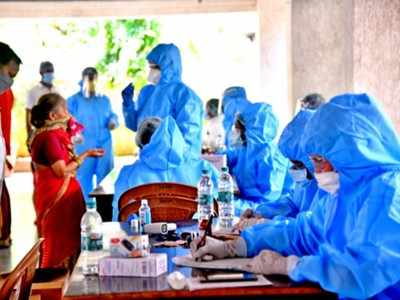Top Searches
- News
- India News
- Time to dry sneeze droplets may affect Covid spread: Study
Time to dry sneeze droplets may affect Covid spread: Study

Representative image
NEW DELHI: Cities where cough or sneeze droplets took a shorter time to dry out due to higher temperature and lower humidity had a lesser spread of Covid-19 infection, a study by two professors from IIT Bombay has found, report Malathy Iyer & Clara Lewis.
Rajneesh Bhardwaj and Amit Agrawal worked out the time a droplet, possibly coughed out by a novel coronavirus patient, takes to dry and mapped it with daily infections in six cities across the world.
“The likelihood of survival of the virus increases roughly by five times under humid conditions compared to dry conditions,’’ said Bhardwaj. With monsoon soon to hit Mumbai, which is accompanied by high humidity levels of over 80%, Agrawal feared the city could see a surge in Covid infections.
Agrawal said, “In Mumbai and cities in Kerala, if humidity is one of the main factors determining the infection, we could expect things to worsen.” But several doctors were not convinced. The high humidity levels and the monsoon could actually work in Mumbai’s favour, said a civic doctor.
In an article published in a peer-reviewed journal of the American Institute of Physics called “Physics of Fluids” late on Tuesday, the Mumbai-based engineering teachers found that droplet drying time was lowest in Singapore and higher in New York, which is among the world’s worst-hit cities. Sydney, Miami and Los Angeles, too, had quicker drying times and saw a relatively lower infection spread.
The IIT-B duo took up the research to answer a popular question: how long does the coronavirus remain alive after an infected person coughs or sneezes? It is known that once the droplets evaporate, the virus in them dies quickly.
“Our simple graph explains aslow or fast growth of the infection in a particular city. This may not be the sole factor, but definitely the outdoor weather matters in the growth rate of the infection,” said Bhardwaj, who said the droplets are as thin as human hair.
A doctor in the state task force on Covid said the monsoon could aggravate the situation. “We cannot predict with the coronavirus as it is relatively new. There are 35 known mutations the world over and the more deadly A2a strain has been found in parts of Maharashtra, Gujarat and Rajasthan. In July we will need more ICUs. Stay home as much as possible,” he said.
Rajneesh Bhardwaj and Amit Agrawal worked out the time a droplet, possibly coughed out by a novel coronavirus patient, takes to dry and mapped it with daily infections in six cities across the world.
“The likelihood of survival of the virus increases roughly by five times under humid conditions compared to dry conditions,’’ said Bhardwaj. With monsoon soon to hit Mumbai, which is accompanied by high humidity levels of over 80%, Agrawal feared the city could see a surge in Covid infections.
Agrawal said, “In Mumbai and cities in Kerala, if humidity is one of the main factors determining the infection, we could expect things to worsen.” But several doctors were not convinced. The high humidity levels and the monsoon could actually work in Mumbai’s favour, said a civic doctor.
In an article published in a peer-reviewed journal of the American Institute of Physics called “Physics of Fluids” late on Tuesday, the Mumbai-based engineering teachers found that droplet drying time was lowest in Singapore and higher in New York, which is among the world’s worst-hit cities. Sydney, Miami and Los Angeles, too, had quicker drying times and saw a relatively lower infection spread.
The IIT-B duo took up the research to answer a popular question: how long does the coronavirus remain alive after an infected person coughs or sneezes? It is known that once the droplets evaporate, the virus in them dies quickly.
“Our simple graph explains aslow or fast growth of the infection in a particular city. This may not be the sole factor, but definitely the outdoor weather matters in the growth rate of the infection,” said Bhardwaj, who said the droplets are as thin as human hair.
A doctor in the state task force on Covid said the monsoon could aggravate the situation. “We cannot predict with the coronavirus as it is relatively new. There are 35 known mutations the world over and the more deadly A2a strain has been found in parts of Maharashtra, Gujarat and Rajasthan. In July we will need more ICUs. Stay home as much as possible,” he said.
FacebookTwitterLinkedinMail
Start a Conversation
end of article
Trending Topics
Quick Links
Coronavirus in MumbaiCoronavirus in KolkataCoronavirus in HyderabadCoronavirus in DelhiCoronavirus in BangaloreCoronavirus symptomsCoronavirus in IndiaWhat is CoronavirusCoronavirus NewsSolar EclipseNPRWhat is NRCCAB BillCAB and NRCRTI BillPodcast newsLok SabhaShiv SenaYSRCPCongressBJP newsUIDAIIndian ArmyISRO newsSupreme Court